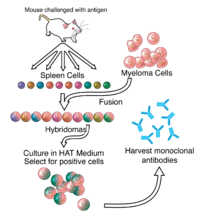
Photo from wikipedia
Background MONARCH (NCT02332590) was a randomized, active-controlled, double-blind, double-dummy, phase 3 superiority trial comparing sarilumab monotherapy with adalimumab monotherapy. Exploratory biomarkers associated with inflammation, bone erosion, and cardiovascular (CV) risk… Click to show full abstract
Background MONARCH (NCT02332590) was a randomized, active-controlled, double-blind, double-dummy, phase 3 superiority trial comparing sarilumab monotherapy with adalimumab monotherapy. Exploratory biomarkers associated with inflammation, bone erosion, and cardiovascular (CV) risk were evaluated in this study. Objectives To compare the effects of sarilumab monotherapy vs adalimumab monotherapy on circulating biomarkers associated with acute-phase response (CRP, serum amyloid A [SAA]), bone resorption (RANKL and osteoprotegerin [OPG]), and CV risk (lipoprotein (a) [Lp(a)]) in patients from MONARCH. Methods Sera were analyzed at baseline and posttreatment through wk 24 from patients who consented to biomarker analyses and received SC sarilumab 200 mg q2w (N=153) or adalimumab 40 mg q2w (N=154). Biomarkers were assessed using validated ELISAs. Nonparametric methods were used to evaluate differences in the percent change from baseline in biomarker levels between treatments at each time point. Percent change from baseline in biomarkers at wk 24 was also compared, separately by treatment group, between ACR50 responders and nonresponders at wk 24. The Benjamini-Hochberg procedure was used to correct P values for multiplicity and control false discovery rate. Significance level was P<0.05. Results A significant difference in RANKL was observed at wks 2 and 24 between sarilumab and adalimumab groups (P<0.0001; Table). Numerically, RANKL decreased after sarilumab and increased after adalimumab treatment. Significantly greater reductions in Lp(a), SAA, and CRP were observed at wks 12 and 24 after treatment with sarilumab vs adalimumab. The difference in OPG between groups was significant at wk 2 only.Table 1. Median Percent Change From Baseline in Serum Concentrations of Circulating Biomarkers Sarilumab 200 mg q2w (N=153) Adalimumab 40 mg q2w (N=154) CRP Wk 12 -94.2† -29.7 Wk 24 -94.0† -24.0 SAA Wk 12 -79.9† -32.2 Wk 24 -83.2† -17.4 RANKL Wk 2 -2.5† 4.4 Wk 24 -18.3† 10.5 OPG Wk 2 0.9* -4.0 Wk 24 2.2 3.3 Lp(a) Wk 12 -35.0† -0.4 Wk 24 -41.0† -2.8 *Adjusted P<0.01 vs adalimumab. †Adjusted P<0.0001 vs adalimumab. At wk 24, change in OPG, RANKL, and Lp(a) did not differ between ACR50 responders and nonresponders at wk 24 in either treatment group. Responders in both groups demonstrated greater reductions vs nonresponders in CRP (sarilumab, -95.8% vs -87.3%; adalimumab, -47.6% vs -6.4%; all P<0.01); a trend was observed for SAA (sarilumab, -92.3% vs -73.2%; adalimumab, -33.0% vs 0.0%; unadjusted P<0.05, not significant after adjustment). Conclusions Sarilumab monotherapy significantly suppressed bone-resorptive and CV risk markers to a greater degree than adalimumab monotherapy. Reductions in CRP were significantly different in ACR50 responders vs nonresponders after either treatment. Analyses to assess predictive and prognostic effects of biomarkers (including markers of myeloid and lymphoid synovial phenotypes) are ongoing. Acknowledgements This study was sponsored by Sanofi Genzyme and Regeneron Pharmaceuticals, Inc. Editorial support was provided by MedThink SciCom and funded by Sanofi Genzyme and Regeneron Pharmaceuticals, Inc. Disclosure of Interest C. Gabay Consultant for: Roche, Merck, AbbVie, Pfizer, Bristol-Myers Squibb, Sanofi-Aventis, and AB2 Bio, J. Msihid Shareholder of: Sanofi R&D, Employee of: Sanofi R&D, C. Paccard Shareholder of: Sanofi R&D, Employee of: Sanofi R&D, M. Zilberstein Shareholder of: Sanofi R&D, Employee of: Sanofi R&D, N. Graham Shareholder of: Regeneron Pharmaceuticals, Inc, Employee of: Regeneron Pharmaceuticals, Inc, A. Boyapati Shareholder of: Regeneron Pharmaceuticals, Inc, Employee of: Regeneron Pharmaceuticals, Inc
Journal Title: Annals of the Rheumatic Diseases
Year Published: 2017
Link to full text (if available)
Share on Social Media: Sign Up to like & get
recommendations!